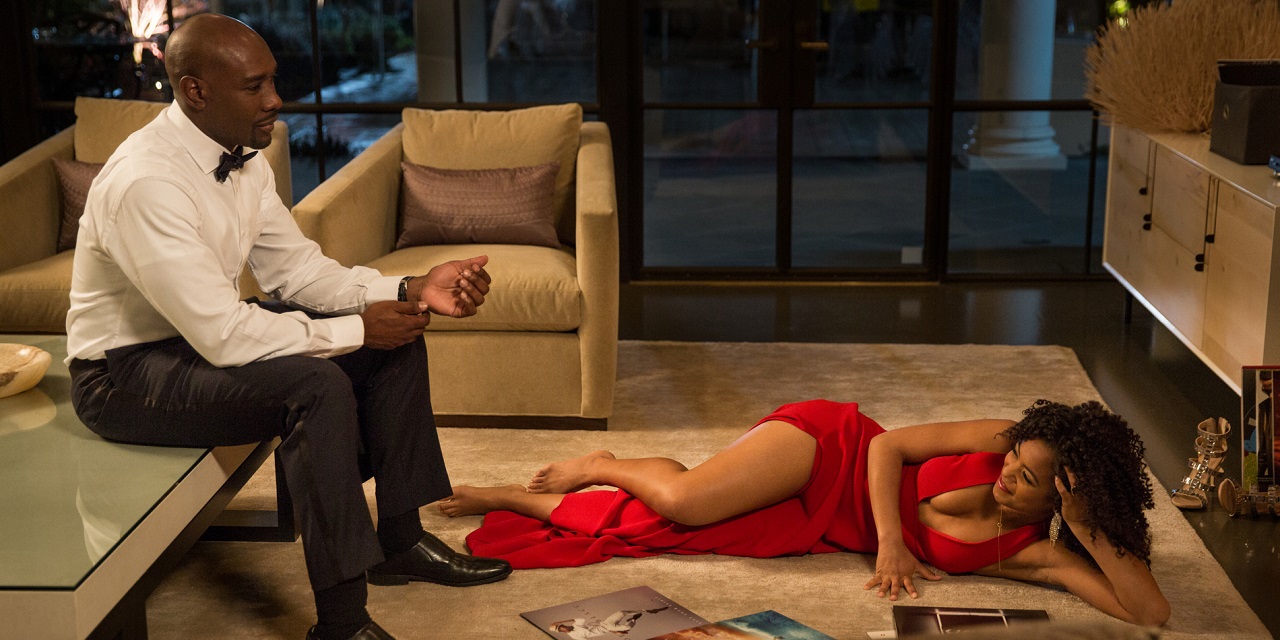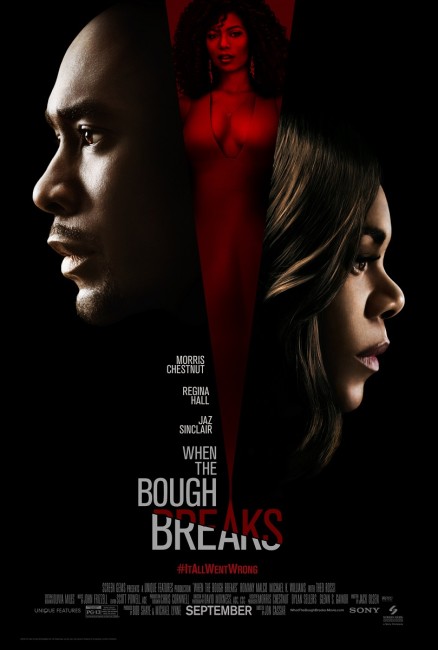Crew
Director – Jon Cassar, Screenplay – Jack Olsen, Producers – Michael Lynne & Bob Shaye, Photography – David Moxness, Music – John Frizzell, Visual Effects – Temprimental Films, Inc. (Supervisors – Culley Bunker & Rif Dagher), Special Effects Supervisor – Ken Clark, Makeup Effects – Gary J. Tunnicliffe, Production Design – Chris Cornwell. Production Company – Unique Features
Cast
Morris Chestnut (John Taylor), Regina Hall (Laura Taylor), Jaz Sinclair (Anna Walsh), Theo Rossi (Mike Mitchell), Michael K. Williams (Roland White), Romany Malco (Todd Decker), Glenn Morshower (Martin Cooper), Tim Nowicki (Peter Kaye)
Plot
John Taylor is a successful lawyer in New Orleans. He and his wife Laura are happily married where the only thing they lack is a child. Laura is no longer able to conceive and their only hope lies in a single embryo they have preserved. After searching, Laura thinks they have found the perfect surrogate in waitress Anna Walsh. They agree to terms and the embryo is implanted in Anna. John is then called to Anna’s place after her boyfriend Mike beats her up. He is insistent that she come to stay in their guesthouse and serves Mike with a restraining order. However, Mike and Anna have been scheming together and are planning to shake the Taylors down for money by refusing to hand over the baby. Living in the house, Anna becomes attracted to John even though he rebuffs her. Anna then becomes increasingly fixated on John, determined that he will be hers at all costs.
When the Bough Breaks is a type of film that doesn’t get made anymore. It is a throwback to a certain breed of Psycho-Thriller that was at its height in the late 1980s/early 1990s following the success of Fatal Attraction (1987). There were numerous copycats during this period such as Pacific Heights (1990), Basic Instinct (1992), The Hand That Rocks the Cradle (1992), Single White Female (1992), Unlawful Entry (1992), The Crush (1993), The Temp (1993) and a great many others usually made for cable. In these, a successful and upstanding family man has his life turned upside down when typically a woman appears and starts tearing his comfortable existence apart. This was a genre that disappeared after the end of the 1990s – and judging from the indifferent box-office performance that When the Bough Breaks was greeted with, one that seems unlikely to be returning any time soon.
When the Bough Breaks – not to be confused with the fine serial killer thriller When the Bough Breaks (1994) – is a belated wannabe among this 1990s middle-class anxiety thriller. The major difference is that for no obviously apparent reason it has been recast with an all-Black principal cast. Morris Chestnut is the high-rising African-American lawyer; Jaz Sinclair is the surrogate mother from the poor side of town that develops a stalkerish fixation on him. Despite this, the filmmakers want you to pretend to be colour-blind and read When the Bough Breaks in the same way you would a 1990s Fatal Attraction copy. Unfortunately, the glaring obviousness of the fact that it is now played out by a Black cast sends out some uncomfortable race associations that leave you scratching your head.
In writing this, I sincerely hope that I am not making any kind of racial generalisations or appealing to stereotypes; I am merely trying to address the politics the film stirs up and I apologise to anyone if this comes across as seeming anything else as it is not intended. There would be few people who would disagree with the statement that statistically most African-Americans live in less well-off economic conditions than their Caucasian counterparts do – if in doubt, I quote statistics from The Washington Post.
In the film, we are shown the perfect life of Black couple Morris Chestnut and Regina Hall and their lavish home, which would probably have a market value of well over a million dollars. He is seen as very much seeking to fit into the world of white boss Glenn Morshower. You wonder – should Black American audiences (who are in a disproportionately lower socio-economic bracket than white audiences but would more likely be the ones watching the film) regard this as a symbol of aspirational success or else see the lavishly depicted lifestyle as one so beyond their reach they should cheer on its being torn apart? In that unbalanced stalker Jaz Sinclair is seen from coming from the poorer neighbourhoods (the ones many Black Americans would live), is she meant to be someone enacting class resentment against the wealthy and the Uncle Toms who have sold out to be part of a white world or should one walk away with the message that being poor and a minority creates a natural preponderance for criminal behaviour? (The only two people down the lower end of the socio-economic scale we meet, Jaz Sinclair and Theo Rossi, are characterised as untrustworthy, violent, engaged in a criminal scam or psychopathically disturbed).

Or are we just to assume that modern Black audiences are meant to view the film from the same perspective that white middle-class audiences of the 1980s/90s greeted Fatal Attraction et al and felt sympathy in seeing the protagonist’s comfortable middle-class lifestyle being invaded and overturned. (It should be noted that no African-Americans are involved on the production side of the film).
When the Bough Breaks is so determined to be uncontroversial that it proves uninteresting. Morris Chestnut is such a heroically upright family man that his only temptation is looking in on Jaz Sinclair through a window and yet quite unbelievably he can dismiss her come-ons later without even thinking about it. (Fatal Attraction at least had Michael Douglas in the uncomfortable position of having had an affair). The film is so nauseatingly glowing about the joys of parenting that it becomes unpalatable to anyone who is single/unmarried or has no aspirations to parent.
The script is like an obstacle course of blatantly foreshadowed elements – the red dress, the loose drainpipe outside the guest house, the big court case, Theo Rossi mentioning how he likes to look in the window at women undressing. Jaz Sinclair is a morass of confused motivation – at various times the victim of an abusive boyfriend, engaged in a confidence scheme to ransom the baby, or developing a psychopathically jealous attraction to Morris Chestnut. Jon Cassar stir so little tension that there is not a single sequence that does not feel like a cliche. As a result, When the Bough Breaks disappears into a yawn-inducing tedium.
Jon Cassar is a Maltese-Canadian director/sometimes producer who has worked extensively in US television since the 1990s. This has included work on shows like La Femme Nikita (1997-2001), 24 (2001-10) and The Kennedys (2011), among numerous others. His one other genre work was the submarine nuclear drama Danger Beneath the Sea (2001).

